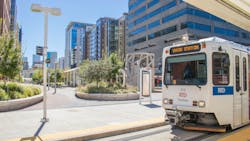Denver RTD seeks to expand mental health, homelessness outreach
The Denver Regional Transportation District (RTD) says its working to expand its efforts to address mental health issues and incidents from system riders and facility users, which includes seeking a new full-time position for a homelessness services coordinator and liaison.
For about a year now, Denver RTD has had a full-time mental health counselor working where needed in the transit system, riding along with security personnel for outreach and for incident response, explained Transit Police Division Deputy Chief Steve Martingano.
The current position is jointly funded by Denver RTD and the Mental Health Center of Denver, which also provides the professional staffing. With one position working relatively long shifts, the mental health staffer brings coverage from 7:00 a.m. to 5:00 p.m. Monday through Thursday, Martingano said.
“We’d like to have people at least five days a week, if not more, and then also at night. We’re a 24-hour operation here, and we have a lot of issues at night, [so] it would be great to have nighttime coverage,” he said. “Ideally, RTD would be able to have mental health staffing on a shift from 6:00 or 7:00 a.m. to 5:00 p.m., and then an overlapping person from 2:00 p.m. to 2:00 a.m., with a focus on Union Station, where mental health issues and homelessness issues tend to concentrate.”
Denver RTD security and planning officials are currently in talks to find additional funding for a second mental health position. The security team is also leading the way in seeking a federal grant to hire a full-time homelessness services coordinator.
The Federal Transit Administration made a multimillion-dollar pool available this year called HOPE Program grant funds, aimed at wider socioeconomic and planning issues than the core operation of delivering transportation. Denver RTD’s system is increasingly impacted by metro residents experiencing homelessness, whether sheltering on buses, seeking refuge in RTD facilities such as Union Station or using bus stop shelters without riding, says the agency.
Denver RTD also serves as the primary transportation for those experiencing homelessness, including many who need to get from one part of town to another to use city or nonprofit services such as shelters, food, job assistance or counseling. A current task force bringing together Denver RTD, city services and nonprofit agencies meets to coordinate as much as possible, Martingano noted, but a full-time, dedicated staffer would improve services and attention to a vulnerable population.
For example, when some shelter services moved from the north downtown area to the Denver Coliseum area, dozens of new riders began using Route 48 with no advance notice. With better coordination, Denver RTD could plan expanded bus service in advance and help train or advise operators about new demands, Martingano said.
Denver RTD’s efforts to improve safety, comfort and services through non-police methods are a good fit with the current movement to consider cuts or alterations to metro police budgets across the nation, he added.
“Why don’t we hire an outreach counselor instead of another security officer,” Martingano said. “We’re hoping that people see that vision.”
